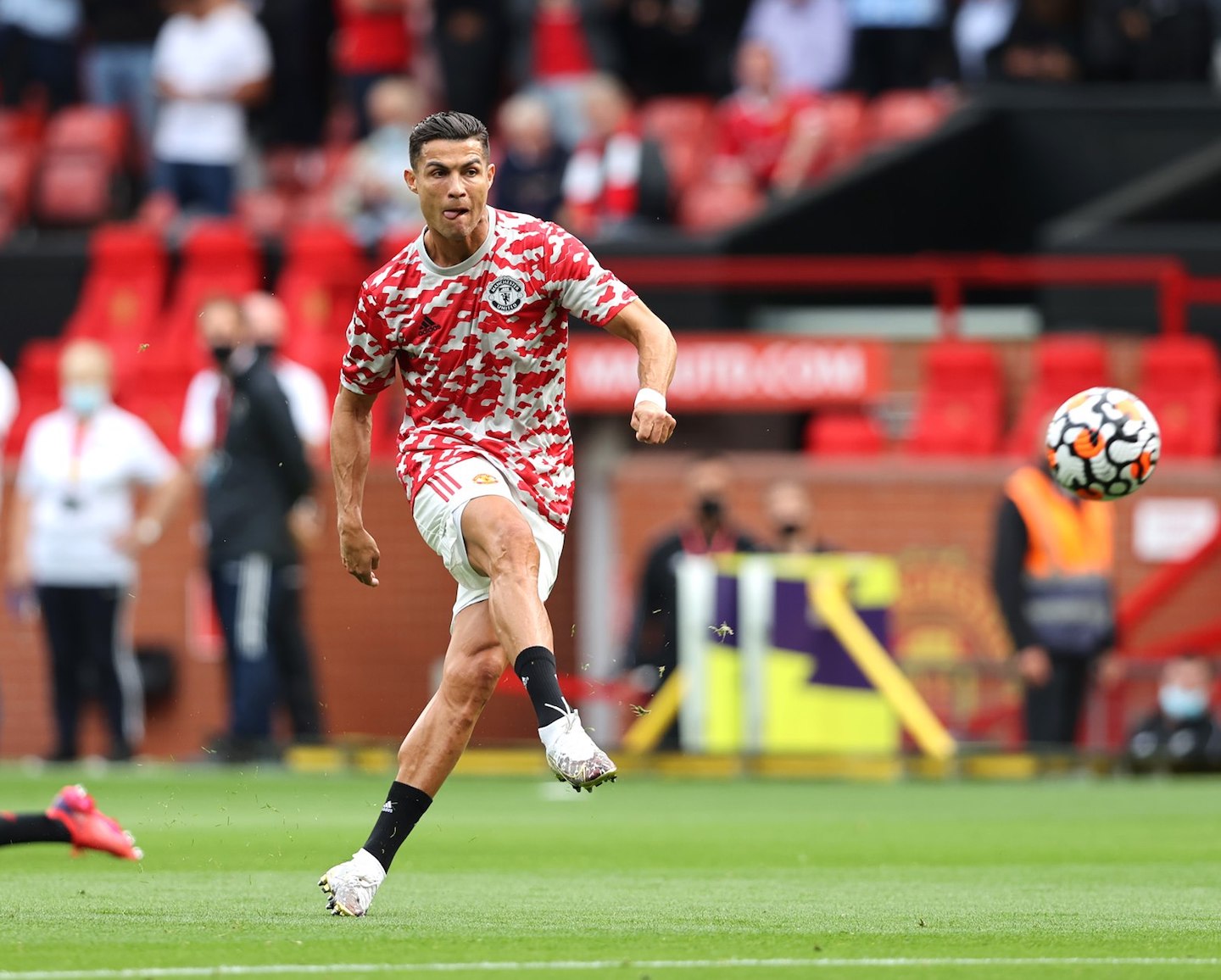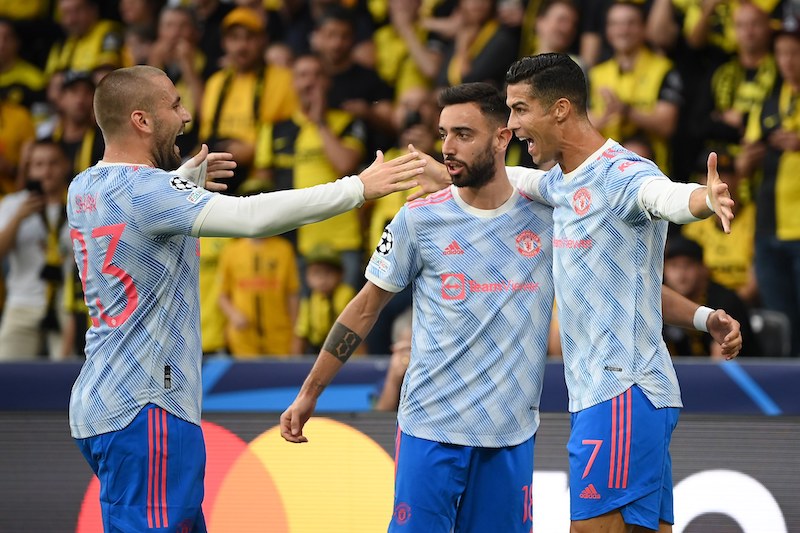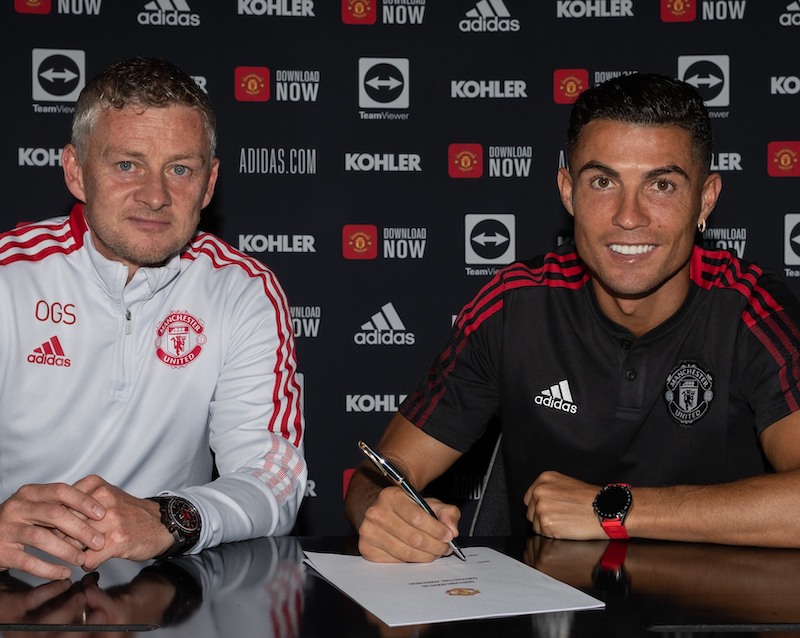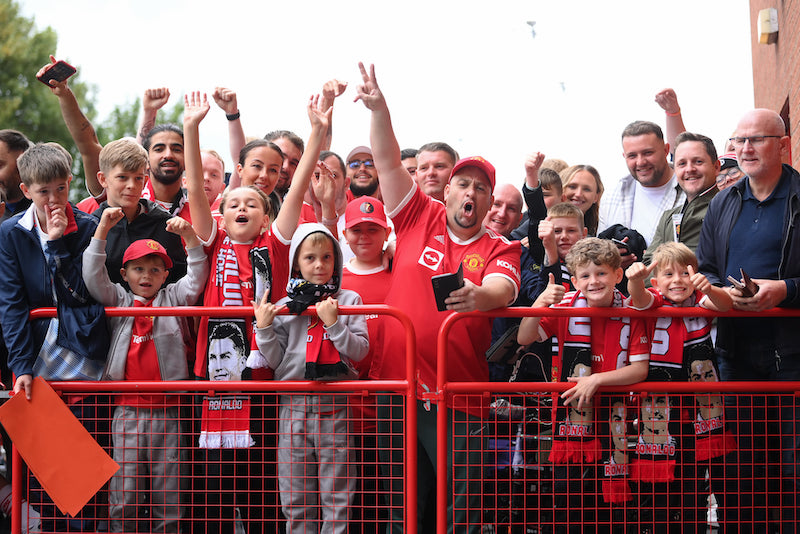
Ronaldo returned to MU after 12 long years (All photos: Manchester United)
One imagines it must have been a truly dizzying 48 hours, between Aug 27 and 29, for Cristiano Ronaldo as his fate was decided by a few deft moves during the 2021 summer transfer window. It was a combination of a well-played game of poker and musical chairs, let’s say, that led to the Portuguese soccer superstar staging his well-received comeback to Manchester United (MU) from Juventus.
It all began with Harry Kane choosing to remain with Tottenham Hotspur, leaving Manchester City with funds to acquire a new player. Ronaldo was on their radar, having expressed his disquiet at Turin when he declared it might be best not to start Juventus’ opening fixture of this year’s campaign. When MU heard that their former forward was potentially available but also possibly being courted by archrivals Manchester City, they played their ace card quickly — former manager Sir Alex Ferguson and teammate Rio Ferdinand launched a charm offensive, convincing Ronaldo to return to the team that made him one of the world’s best football players. Voilà, the deal was done.
This year’s transfer window had begun with a great deal of excitement when Lionel Messi left Barcelona for Paris Saint-Germain after his contract ended at Camp Nou, but having it bookended by yet another unexpected move was beyond even the most seasoned pundit’s expectations. MU manager Ole Gunnar Solksjaer had completed strategic deals including £73 million for Jadon Sancho from Borussia Dortmund, as well as a £34 million move for France World Cup winner Raphael Varane from Real Madrid, so it was safe to assume his buying spree was over. By this time, rumours had already started that Man City were on the brink of signing Ronaldo.
On Aug 27, days before the transfer window closed on Aug 31, the unthinkable happened — it was announced that Ronaldo would return to MU after 12 long years. The football world then went a little bit mad.
The fan factor
Every home with a Ronaldo fan would have a “what I was doing when I heard the news” story. My daughter and I were setting the table for dinner when my diehard Manchester United fan husband leapt out of his chair in glee, having read a tweet from SkyNews that Ronaldo was, in his words, “coming home”. Should I set another seat for dinner, I quipped. He didn’t laugh.
The news was greeted with the same euphoria by fans all over the world, and even spilled over to followers of other clubs. It is an exciting development for the sport in general after a difficult year owing to the pandemic.
ronaldo.jpeg

“It was big news because it was so unexpected. Even as recent as two weeks ago, neither Manchester City nor Manchester United had even indicated an interest in Ronaldo,” comments football pundit and author Bob Holmes. “He is one of the greatest players United have ever had, so the euphoria is perfectly understandable … even for fans of other clubs, as he is an exciting player to watch on the field and that he is coming back to the Premiere League is really great.”
The Portugal captain started his career in Sporting Lisbon at 18, and was hand-picked by Ferguson to play for MU before he moved on to Real Madrid and later, Juventus. In that time, Ronaldo became one of football’s brightest talents and was universally acknowledged for his professionalism both on and off the field. He never drank (his father died of alcohol-related diseases when the footballer was just 20) and has no tattoos as he frequently donates blood and bone marrow.
Ronaldo’s dedication to the sport, his commitment to fitness and continued ability to deliver make him highly desirable for any club, but a two-year contract for someone aged 36 is almost unheard of. It bears some similarity to the way American quarterback Tom Brady signed with the Tampa Bay Buccaneers last year at the age of 43. Both teams are owned by the Glazer family, incidentally, signifying a commonality in approach: Age doesn’t matter, but the ability to score goals and attract fans does. “Actually, the Tom Brady logic was presented to the Glazer family to convince them that Ronaldo was a good idea. It really didn’t take much convincing after that,” Holmes says, indulging in a bit of industry gossip.
Some fans may not agree with this, but since Ferguson’s retirement in 2013, the team he once guided to multiple victories hasn’t had the best of times. A rotating roster of managers and players has made things a little dull over the years, although Solksjaer has certainly made a positive difference in the last two seasons or so. A player as successful as Ronaldo is bound to make a Premiership victory a done deal for MU and fans are certainly expecting that of him, but is that really a done deal?
“There’s an argument that Ronaldo’s return might be a mistake. Could he make things worse, like he did in Juventus? He disrupted the team so much that all the goals he scored simply weren’t enough for a win,” Holmes points out. “Yes, he delivered on his personal promise, but the team couldn’t quite keep up. This could be why Manchester City were reticent about signing him on, as they are built on more of a team ethic. But I think that’s what is so exciting about this — it really could go either way, and it’s left to be seen how things play out.”
Ferguson himself always put the team ahead of individual players, but Ronaldo never liked being substituted. Juventus manager Massimiliano Allegri did, so Solksjaer has his work cut out for him.
Here is another question: Would the excitement surrounding Ronaldo’s return have been greeted with the same enthusiasm in a pre-Covid-19 world? We will never know the answer to that, but no one can deny that, as countries like ours continue to live in lockdown, this sort of good news is uplifting for fans, who in the UK are just starting to return to stadiums. In Malaysia, we still cannot enjoy the camaraderie of watching a game in a large crowd, but sitting alone in front of our TVs suddenly doesn’t feel quite as sad anymore since, as many fans are sure to chant every chance they get, “Ronaldo is coming home”.
Money matters, mentorship + social media
The Edge is a financial publication, so the numbers behind the transaction was of great interest to us. MU’s former manager Jose Mourinho called the whole thing “perfect business”, meaning that all related parties were happy with the transfer arrangement. In fact, this is also set to be a commercially successful deal for the Old Trafford team. The transfer cost them £12 million, plus a further £6.86 million in add-ons, but they very quickly started reaping the dividends of bringing Ronaldo back — MU’s share price soared 9.8% at one point before falling back slightly. On the day the announcement was made, it opened at £12.62, but news of the transfer caused it to spike to £13.87, increasing the club’s market value by £212 million.
Ronaldo has done this before. His transfer to Juventus in 2018 made the Italian club’s revenues surge with earnings of €58 million, according to Gazzetta dello Sport. His €100 million signing caused the team’s shares to soar 150% in the first year. His presence also helped Juventus sell 1.3 million shirts; the 10th most in the sporting world in the 2018/19 financial year.
signing.jpeg

The value of his personal brand is almost immeasurable. His CR7 brand — his new squad number is unknown at press time because of uncertainty surrounding Edinson Cavani’s future — has flourished and spawned many lucrative major sponsorships, whether it be football boots or tracksuits, and has been used to sell everything from underwear to hotels, gyms, nutritional supplements and cologne. He is expected to do the same at MU, where the sales of T-shirts and other merchandise are sure to make up for his fees. One wonders — will as many children want to get CR7 boots when he is actually CR36, or whatever it may be? This is something Nike, with whom Ronaldo has a long-term deal, has to think about.
Connected to his financial star power is his impact on social media. Endorsement partners such as Nike, Clear and Herbalife benefit from his unmatched following of 575 million fans, including a record 333 million on Instagram alone. According to analytics firm Hookit, he generated US$75 million in value on social media for sponsors last year. Ronaldo’s follower count is more than that of Major League Baseball, its teams and all of its players combined, and lends a Midas touch to any team he joins.
Due to its immediacy, social media was where fans flocked to get updates on Ronaldo’s signing, bringing millions of eyeballs to sports-related Twitter and Instagram accounts (sorry, Facebook) for information: no update was too insignificant, the smallest piece of news read, re-tweeted and shared excitedly.
The impact has been astounding. After the transfer was confirmed on Aug 29, MU’s Instagram account gained over two million followers in less than a day, the official announcement post scoring 13 million likes and becoming the most-liked post ever for a sports team. This number is set to rise in the coming days, too.
It is also worth noting that Ronaldo is as capable of sinking share prices as he is of driving them up; so too with social media. In June, his gesture for people to drink water instead of Coca-Cola at a Euro 2020 press conference wiped US$4 billion off the company’s market value as its shares dropped from US$56.17 to US$55.22. In a similar vein, Juventus has lost in excess of 200,000 followers since Ronaldo’s departure — a reminder that the Midas touch works in reverse, too.
As important as money matters surrounding Ronaldo’s return are, it is safe to say that MU’s decision might have been emotionally driven more than anything else. Having him around does not fill any pressing gap, and Solksjaer is not looking for a forward who can score goals in the double digits. But Ronaldo’s presence makes everyone feel good, and that is quite a big consideration.
What has also touched fans is Ferguson’s role in this. After he retired, the Scotsman has resolutely stayed out of the public eye as per his promise to his wife — he staged his quiet, temporary return just to secure this deal.
In fact, Ferguson’s brand of leadership and mentoring young talent is well-known, his fatherly support for players starting from Eric Cantona to Ronaldo well documented. He was as firm with them as he was tender — the famous hair dryer treatment comes to mind — but his intention was always to nurture, guide and inspire. This is an investment that has paid off handsomely, as Ronaldo has always openly credited Ferguson for making him the player he is today. In his recent Instagram post reaffirming his elation at coming home to Old Trafford, Ronaldo signed off with “PS — Sir Alex, this one is for you…”. A valuable lesson indeed for those of us in leadership positions seeking to inspire and motivate a younger generation — it requires honesty, strength and vulnerability, and its payoff often takes years.
With all the fanfare surrounding his move, there is also talk that Ronaldo’s star power has become too big for football — this is also the case with Messi — and that their presence at both clubs are short-term moves. But that isn’t necessarily a bad thing. At a time when hope seems scarce and news has been relatively depressing, football has given us all something to cheer about.
Ah, the beautiful game indeed.
This prodigal son has returned
Additional commentary by Azam Aris, editor-in-chief of The Edge
ronaldo_fans.jpeg

In the world of football, prodigal sons do not always return. Just like when George Best walked out of the Manchester United team in January 1974 after manager Tommy Docherty dropped him from the FA Cup tie with Plymouth Argyle.
Best was angry as, although he missed a training session on Wednesday that week, he felt he was fit enough to start. As related in his autobiography, The Good, The Bad and The Bubbly, Best told Docherty in a heated argument that, “If I’m not good enough to play against (minnows) like Plymouth, then I’m not good enough to play against anybody”.
MU won the match 1-0. After the match, Best stayed behind, walked into the empty stands of Old Trafford, and reminisced about the great European games, the goals and the roar of the crowds. “I sat there for 20 minutes, then got into my car and drove away. Forever.”
He was still 27, and many supporters believed Best, a highly skilful dribbler, was not even at his peak yet. Only six years earlier in 1968, when MU won the European Cup, he had won the Ballon d’Or and the European Footballer of the Year award. Booze and women were a problem but on the pitch, Best was certainly among the best in the world.
After MU, he became a footballing journeyman, his trade taking him all over the world, to smaller clubs in the UK and American glamour clubs in California and Florida. But many MU fans fancied that he would return to the club one day. Perhaps there was a manager out there who was willing to take the risk, bring him back and get the best out of him. Sadly, none were able to.
Call him the King or Enfant Terrible if you like, Eric Cantona was the final piece in MU manager Sir Alex Ferguson’s jigsaw that kick-started, beginning 1993, the team’s two-decade dominance of the English Premier League.
After helping MU win their fourth Premier League title in five years, Cantona decided in May 1997 that he had had enough of football, but the Old Trafford faithfuls did not believe him. At the age of 30, there was supposed to be many more footballing years and victories to come, and they felt that after a year’s break, acting and writing poems — doing things he liked — the King would be back in the red jersey of MU. And if there was one man who could persuade him, it would be Ferguson.
After all, Cantona always regarded himself as more than a footballer, an artist who liked to entertain the crowd, and Old Trafford was his theatre of dreams. For all his love for MU, Cantona did not return and remains a man full of mystery. He once said: “I do not want any inscription on my tombstone. A blank stone, because what I would like to leave behind me is the sentiment of a great mystery.”
Over the years, apart from participating in testimonials and charity matches at Old Trafford, both Best and Cantona did not wear the red jersey again as professional players.
When Cristiano Ronaldo left MU in May 2009, fans felt the scrawny kid — who joined the club in 2003 and became a world-class player — had given his all for the club. He helped them to three Premier League titles, the FA Cup, the League Cup, and the European Cup in 2008, which earned him his first Ballon d’Or. He even stayed for another season after agreeing to join Real Madrid.
With a transfer price of £80 million — then a world record transfer fee — the deal made good footballing business sense, but MU fans never thought that Ronaldo would bloom into the best player in the world, smashing 450 goals in 438 games for Real Madrid. There, he won four more European Cups and Ballon d’Ors each.
After Real Madrid, MU faithfuls again dared to dream of the possibility of Ronaldo ending his career at Old Trafford. Many were disappointed when there wasn’t any effort to bring him back as Juventus paid a hefty £105 million — a fee United could never match — for a player already in his 30s.
Many critics including supporters from MU’s “noisy neighbour” are questioning the deal and the ability of the fading star, now 36, to deliver. They need to be reminded that in his last season with Juventus, Ronaldo was the top scorer in the Italian League — putting in more goals than Romelu Lukaku, whom Chelsea paid £97.5 million to do the scoring business for the Blues this season.
For MU, will there be a happy ending? Will Ronaldo spur more successes and trophies? Will this deal be a financial drain on the club? I could not care less as, unlike Best and Cantona, this prodigal son did return to wear the red jersey of Manchester United again.
Welcome home CR7, welcome home.
This article first appeared on Sept 6, 2021 in The Edge Malaysia.


